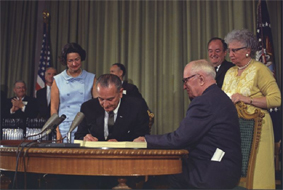JOHNSON'S GREAT SOCIETY
Although Kennedy's accomplishments were meager and were cut short by his assassination, President Lyndon B. Johnson, through his genius for compromise, implemented many of Kennedy's plans and all that Truman had outlined in 1946.
Election of 1964
Lyndon Johnson, a Texan who was majority leader in the Senate before becoming Kennedy's vice president, was a masterful politician. He had been schooled in Congress, where he developed an extraordinary ability to get things done.
 He was a Democrat and was challenged by Barry Goldwater, an Arizona senator and the Republic nominee. Johnson offered a liberal agenda whereas Goldwater offered a conservative campaign against expanding federal power in the economy and in civil rights. He was a Democrat and was challenged by Barry Goldwater, an Arizona senator and the Republic nominee. Johnson offered a liberal agenda whereas Goldwater offered a conservative campaign against expanding federal power in the economy and in civil rights.
Johnson won 61 percent of the popular vote which was one of the great landslides in American history. As president, he wanted to use his power aggressively to eliminate poverty and spread the benefits of prosperity to all.
His immediate priorities were his predecessor's bills to reduce taxes and guarantee civil rights. The tax cuts stimulated the economy. The Civil Right Act (1964) was the most far-reaching such legislation since Reconstruction.
He created the Equal Opportunities for all in order to prevent job discrimination due to religion, national origin, race or sex. He also granted new powers to U.S. attorney general to enforce these rights. After that act, many people saw him as a hero.
Johnson ordered other issues as well. By the spring of 1964, he had begun to use name “Great Society” to describe his socio-economic program. That summer he secured passage of a federal jobs program for impoverished young people. It was a first step in what he called „war on poverty“. The War on poverty became the centerpiece of the administration's Great Society program. The Economic Opportunity Act (1964) set up the Office of Economic Opportunity.
Programs included:
1. Operation Head Start (aiding preschoolers from underprivileged homes)
2. Job corps (for dropouts)
3. Neighborhood Youth Corps (for unemployed teens) etc.
The Department of Housing and Urban Development was created to focus on cities. By this point, the Vietnam War had affected the economy.
 Medical Care came next. Under Johnson's leadership, Congress enacted: Medical Care came next. Under Johnson's leadership, Congress enacted:
- Medicare (1965): Founded through Social Security payroll taxes, it is a health plan for workers over 65, whether retired or still unemployed.
- Medicaid (1965): Founded by taxes, it is a health plan for welfare recipients.
Other legislations had an impact on many aspects of American life. Federal assistance went to artist and scholars to encourage their work. An Elementary and Secondary Education Art (1965) bill was passed on allocating $ 1bilion in federal funds for the impoverished children attending Catholic schools. In 1965, Congress abolished the discriminatory 1924 national- origin immigration quotas. This triggered a new wave of immigration. An Immigration Act (1965) was passed on limiting the number of the new immigrants to 170,000 per year. While immigration from some parts of Latin America was still restricted, people from Asia, Europe, and Africa could enter the United States on an equal basis.
The Great Society was the largest burst of legislative activity since the new deal. But support weakened as early as 196. Some of the Johnson's programs did not live up to expectations; many went underfunded. The urban crisis seemed, if anything, to worsen. Still, whether because of the Great Society or because of a strong economic upsurge, poverty did decline at least marginally during the Johnson administration.
|

